MercoPress. South Atlantic News Agency
Tag: avian influenza
-
Monday, September 9th 2024 - 10:14 UTC
Falklands support for tourism sector affected by pathogenic avian influenza

Following the approval at ExCo on Tuesday 27 August 2024, the Falkland Islands Government are pleased to announce the continuation of the support scheme designed specifically to mitigate the effects of site closures associated with the highly pathogenic avian influenza (HPAI), also known as bird flu, on tourism businesses, operators and employees until 2 April 2025.
-
Thursday, September 5th 2024 - 08:01 UTC
Scientific research study on Avian Influenza Virus, HPAIV
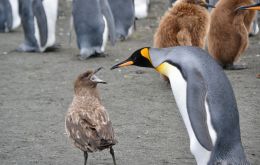
Nature Communications has published and made public an extensive report with full results on field sampling and diagnosis of the deadly Bird Flu virus, high pathogenicity avian influenza virus (HPAIV), detected in the Falkland Islands and South Georgia, which apparently is rapidly spreading to sea birds and mammals species in sub-Antarctica islands and the frozen continent.
-
Thursday, February 15th 2024 - 10:53 UTC
Falklands: confirmed case of avian influenza at Stanley Common
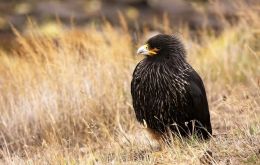
The Falkland Islands Natural Resources Department has announced that on Monday 12 February 2024 swabs that were taken from a dead hawk found on Stanley Common were tested and returned positive for HPAI.
-
Thursday, January 11th 2024 - 16:59 UTC
Avian Influenza detected in mammals in Sub-Antarctica for the first time; DEFRA funds for FlluTrailMap
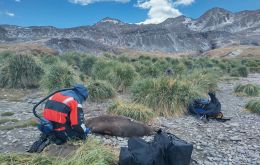
The presence of High Pathogenicity Avian Influenza (HPAI) was confirmed on Thursday 11 January for the first time in mammals in sub-Antarctica. The disease was detected in elephant and fur seals on the island of South Georgia by experts from the UK’s world-leading Animal Plant Health Agency (APHA).
-
Wednesday, December 20th 2023 - 20:22 UTC
Falklands, new confirmed avian influenza case: black browed albatross
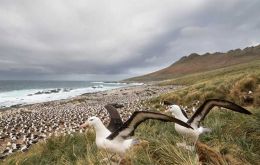
On Tuesday 28 November 2023 a black-browed albatross, that was found dead on Steeple Jason, was swabbed for highly pathogenic avian influenza. A positive result was returned.
-
Thursday, December 14th 2023 - 17:49 UTC
Falkland Islands Government announces support scheme for tourist sector
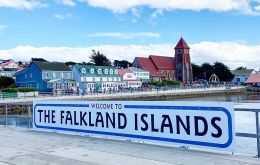
Following the approval at ExCo on Tuesday 12 December, the Falkland Islands Government will now be able to provide details on a support scheme designed specifically to mitigate the effects of site closures associated with the highly pathogenic avian influenza (HPAI), also known as bird flu, on tourism businesses, operators and employees until 31 March 2024.
-
Wednesday, November 22nd 2023 - 08:14 UTC
Avian Influenza outbreak in South Georgia expanding, GSGSSI and BAS survey
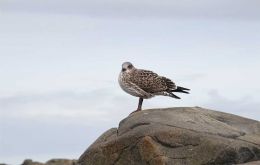
Last month, October 2023, Highly Pathogenic Avian Influenza (HPAI) was confirmed on Bird Island, South Georgia in the brown skua populations. Since then, a number of other cases of symptomatic birds and above baseline mortality have been reported to the Government of South Georgia and South Sandwich Islands (GSGSSI).
-
Tuesday, October 31st 2023 - 11:48 UTC
Avian Influenza confirmed in Bird Island; South Georgia introduces stringent bio-security measures
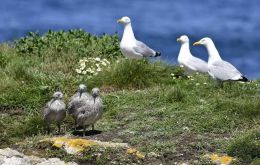
Highly Pathogenic Avian Influenza (HPAI) has been confirmed in brown skua populations on Bird Island, South Georgia. In response to the situation on Monday, the Government of South Georgia & the South Sandwich Islands (GSGSSI) has introduced a comprehensive Management Plan and new regulations to further protect terrestrial habitats and the remarkable animals and plants found in those islands.
-
Monday, October 23rd 2023 - 05:47 UTC
Avian flu has caused the death of some 3,000 Humboldt penguins in Chilean coasts

Some 3,000 Humboldt penguins have died as a consequence of the avian influenza so far in 2023, according to official reports from the Chilean Fisheries National Service, Sernapesca. The data covers the period from February to October 6th and includes the flu death of 21.819 animals, of which 2,917 Humboldt penguins.
-
Thursday, October 12th 2023 - 07:53 UTC
Avian Flu: Uruguay admits burying 400 sea lions; but a similar number tested positive

Uruguay has admitted that some 400 sea lions have died and have been buried in two meters deep graves, taking into account very special sanitary conditions to avoid contagion of the H5 virus or avian flu.
